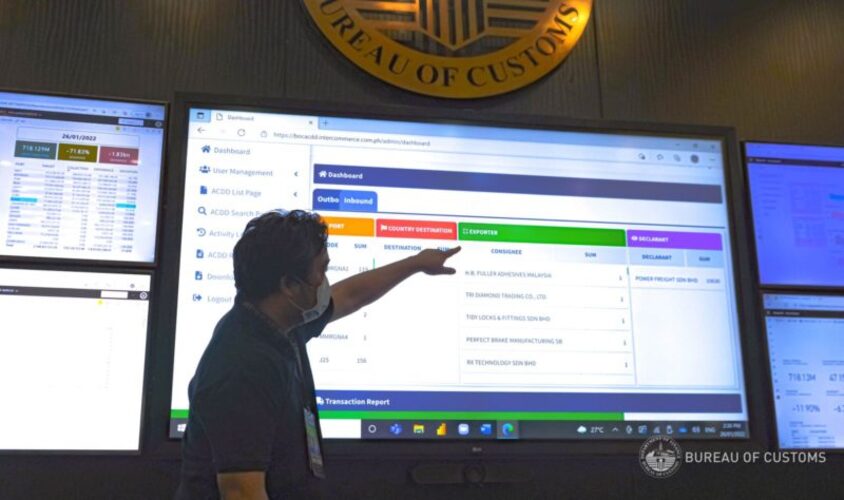The Bureau of Customs (BOC) has issued guidelines for electronic exchanges of Association of Southeast Asian Nations customs declaration documents (ACDDs).
Customs Memorandum Order No. 26-2022, which takes effect on October 5, covers electronic exchanges of customs declaration documents using BOC’s ACDD operations portal in line with the Protocol on the Legal Framework to Implement the ASEAN Single Window (ASW).
The CMO provides the procedures that BOC authorized personnel and stakeholders must follow in using the portal.
The ACDD is a multipurpose document that facilitates exchange of export declaration information among ASEAN members. It includes 15 mandatory information parameters extracted from the export declaration.
The portal will facilitate the exchange of incoming and outgoing ACDD messages through TradeNet and/or the Philippine ASW gateway and ASW gateway of other ASEAN members.
The Philippines joined the live electronic exchange of ACDD this year. Cambodia, Myanmar, Thailand, Malaysia, Singapore, Indonesia, and Brunei. Lao People’s Democratic Republic, or Laos, and Vietnam are expected to join the live operation this year.
BOC had said earlier full implementation of the ACDD exchange will start when the relevant CMO is issued.
Exporters must register on the ACDD portal (http://acdd.customs.gov.ph). The online registration form will be linked to BOC’s profile data. The exporter’s account will be verified through the client profile registration system (CPRS). Only exporters with active CPRS can register and use the portal.
Once registration has been verified, the exporter may proceed with creating an account. Registered exporters will be able to view, track status, print and generate a report for all outbound ACDD messages sent under their accounts.
The portal will facilitate the sending of the outbound ACDD messages to the importing ASEAN members through the Philippine gateway.
The tracking functionality of the portal will inform the exporting country that the message has been received and acknowledged by the importing ASEAN member-state.
The portal will also receive ACDD messages from other ASEAN member states and store these in the portal database. The inbound message will complement BOC’s risk management activity and help reduce customs clearance time for import consignments, CMO 26-2022 said.
Until such time that a TradeNet ACDD module is implemented, exchange of information in the Philippine ASW gateway business-to-business integration will be made using the portal.
TradeNet is the country’s national single window, which is a prerequisite to connect to the ASW.
The ASW is a regional initiative to speed up cargo clearance and promote regional economic integration by enabling the electronic exchange of border documents among the 10 ASEAN member-states.
In December 2020, Cambodia, Myanmar, and Singapore started exchanging the ACDD through the ASW. Malaysia and Thailand followed on March 31, 2021.
In August 2021, BOC said it completed the bidding for its ACDD System. When implemented, the system would enable the Philippines to electronically exchange ACDD on the ASW and help the country to digitalize trade processes and maximize the potential of intra-ASEAN trade.
The ASW also allows the electronic exchange of trade documents such as the electronic Certificate of Origin Form D under the ASEAN Trade in Goods Agreement, and the electronic phytosanitary and animal health certificates that are planned to be exchanged soon.
Currently, electronic certificates of origin can be exchanged by Philippine exporters with other ASEAN members. BOC and other government agencies are also working to onboard all trade regulatory government agencies to TradeNet this year to allow online application for import and export permits.
Earlier, BOC said 21 such agency areas had already onboarded TradeNet, while the remaining more than 50 will be onboarded this year. — Roumina Pablo
SOURCE: PortCalls.com
October 05, 2022













